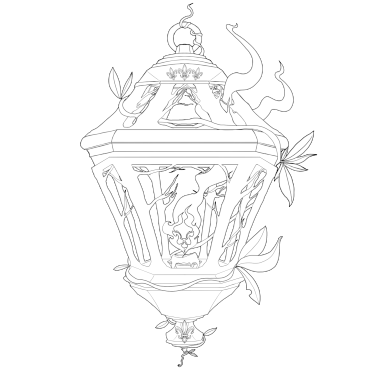Spellcasting
Wizards are characters that are members of one of the four Guilds of Magicians. Also called “sorcerers” (disparagingly), “mages” (improperly) or “Magicians” (professionally), the Guilds are protected under Imperial Trade Law as legal entities with a monopoly over their craft just like any other trade guild. Vastly wealthy, they wield power politically, financially and of course, magically.
There are very few in the world with the dedication, the force of will, and the intelligence to learn magic and use it properly. Of those people, fewer still are those who are lucky enough or clever enough to be invited into one of the four Guilds that hold an unbreakable monopoly over such secrets. Each Guild represents one of the Elemental Forces that make up the world: Fire, Water, Earth, and Air – each with different beliefs and approaches to their studies. The life of a Wizard is a difficult and uphill climb, and a life of privilege. For though the Guilds guard their knowledge jealously, even from one another, and have their own agendas, they keep their loyal agents well taken care of.
The Wizards in each Guild are stratified into a hierarchy called Circles. The most powerful Wizards in the Throne are of the Fifth Circle, and no man living has ever reached a sixth or higher Circle. Those at the highest level of the Guilds work diligently to surpass themselves, and be the first to achieve greater power.
Circles are a social and practical approximation of a given Wizard’s power and skill. A Wizard’s Circle rating is their social rank within the Guild hierarchies as well as how efficiently they can wield magic. A Second Circle Wizard is more respected and powerful than a First Circle Wizard and so on. Besides the increased respect afforded to a Wizard of a high Circle, the biggest benefit of a magical Circle is the deep increase in raw magical power that the Wizard can command, and thus able to cast mightier and mightier magics, in the form of spells.
Spells and Theorems
Every magical effect can be expressed as a written formula that depicts in detail all relevant information in the form of an arcane array. This array and its relevant information in total is called a Theorem. Theorems are proven, reliable and stable magics that have a straightforward effect, such as “create fire.” Theorems are the core of a magical effect, but can be modified in many ways using further magical techniques.
In an encoded form, the Theorem explains all of the details of the spell – what it does, what it costs in magical power to perform, and any special considerations the effect has, such as incompatibility with certain Techniques.
Any Wizard or scholar with the Magic Study that reads a Theorem is able to understand the purpose of the spell it depicts. A Wizard with the proper Element and Domain may attempt to cast a spell using a Theorem that they can either Reference, Studied, or Learned with the Academics Skill. Theorems can be Learned with Academics exactly like Studies. Because this is costly in Experience and Wizards use many Theorems, they usually keep a precious Spellbook full of their magical formulae, and refer to it often.
The Spellbook
Because of the difficulty and detail required to cast the spell, the Wizard must have access to her Theorems in order to cast her spells. She must either Reference her Theorems, Study or Learn them in order to cast. For this reason, Wizard almost always have and maintain a Spellbook with every Theorem they know and keep it precious and secure. If they lose access to their Spellbook or a specific Theorem without internalizing it, they may lose the ability to cast that spell until they get another copy of the missing Theorem.
The primary benefit of a Spellbook is that it can contain any number of Theorems and Mysteries and may be added to with the Author Action. The Spellbook may be Referenced or Studied to gain access to its entire contents.
Channeling
In order to cast a spell, the Wizard must Channel enough magical power to invoke the effect of their Theorem, and pay the costs of any Techniques they use to modify it. Magical energies are everywhere in the world, but usually lie dormant. A Wizard who channels draws forth this power using a specially crafted magical language of words and gestures. The language itself is secondary – the critical aspect is what is internal to the Wizard – their thoughts and will. Achieving the correct mental state causes their consciousness to be flooded with power – a feeling so intense that some are driven mad. Some Wizards have likened the sensation to performing complex mathematics while being burned alive, being crushed, suffocating, or drowning.
Wizards experience the channeling of their specific Element – a Fire Wizard channels the very power of Fire through their soul, then shapes it through their Domain into a Spell that becomes real. The measurements of this energy are often spoken specifically within a given Guild, but are referred to as Fluxes, Vortices and Maelstroms when speaking about magical power generally.
Measures of Power
FIRE
Spark
Blaze
Inferno
Water
Drop
Surge
Tempest
Earth
Burden
Compression
Gem
Air
Breath
Gale
Tempest
Wizards can channel these energies a number of ways:
- Speak an Incantation
- Perform the appropriate Arcane Sign
- Spend Discipline
- Expend a magical Catalyst
- Accept Anacrusis
Using any of these methods is called Channeling, and usually generate a single point of Flux. Each method can only be used once per Channeling attempt. One Flux is usually enough to provide the energy necessary for an unmodified Theorem, and most basic Techniques to add effectiveness to a Spell also require one Flux each. Once the requisite power is gathered for the desired Theorem and Techniques, a Spell can be created and the Wizard can call the Game Effect of the Spell. Magical energies gathered from Channeling require tremendous focus to maintain, and they are lost if the Wizard doesn’t use them within 3 Beats or when they cast a Theorem.
Some more complex Theorems and Techniques cannot be used without a Vortex, or even a Maelstrom. No amount of ordinary channeling can produce these effects, no matter how much Flux is gathered. Special procedures, called Mysteries can be used to produce higher grades of magical power, and other grand effects. Some powerful Wizards can even generate this energy from their Discipline alone. Magical energies can, however, be converted downward – One Vortex may be used as 5 Fluxes, and one Maelstrom can be used as 5 Vorteces.
The Incantation
The Incantation is a mantra that focuses the Wizard’s mind and allows them to navigate through the experience of Channeling. Each Element uses a different phrase to accomplish this. The full incantation can be spoken as fast as the Wizard is able to speak it accurately. The Wizard must speak the entire Incantation with a powerful oratory voice; below shouting but above conversational volume. During Incantation, the Wizard may move no faster than a slow walking pace.
As Wizards grow more powerful, they can learn new Incantations that help them draw forth more magical energies without losing themselves to their power. The basic Incantation is as follows, for each Element:
Deflagrate Ignis et Auctorita Luminos Dextera ex Anima Solarius Praepotentia
Relix Narez Relit Mamuri Worum Sicun Gundavult Vorug ta Verg Tyra
Lurelin Liden Lolthvidorin ay Ladurianim Soladuanadihl Karulieal va Torinim
Ibatoran Hahm Put Halo Tahom Sois Oran de Ibat Fulos Kei Sei Fulos ibi Aran
Arcane Signs
Signs are gestures performed with the hands that invoke arcane power and shape the spell as it is being cast by the Wizard. The gestures involve precise gestures with the hands and fingers, and they are used to Channel as well as use certain Techniques and Arts.
Performing Signs requires the full use of the Wizard hands and fingers, which means that she cannot work them while holding weapons or shields, or wearing any restrictive armor on the hands. While performing Signs, the Wizard may move no faster than a slow walking pace.
Channeling can be performed for each Element by using the Arcane Sign that matches the Element below. Arcane Techniques, Mysteries, and more advanced Channeling, use other signs.
For a full list of Arcane Signs and how to perform them, see Arcane Attainment.

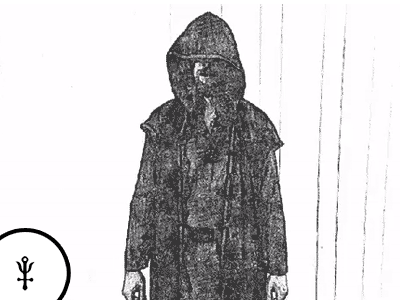
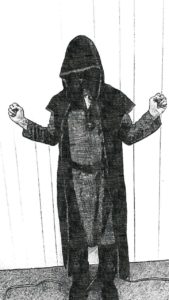
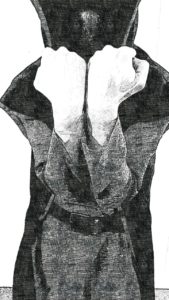
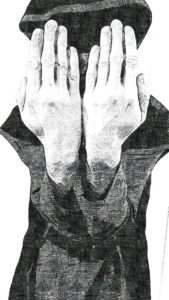
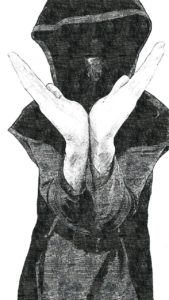
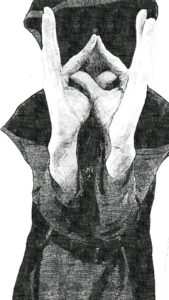
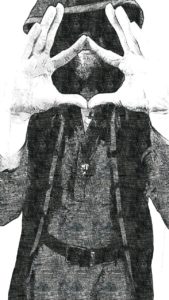
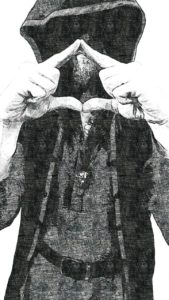
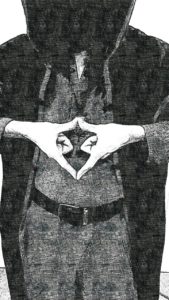
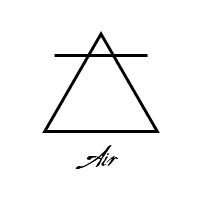
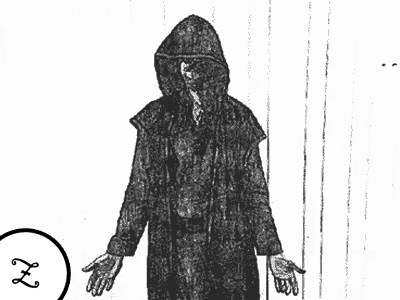
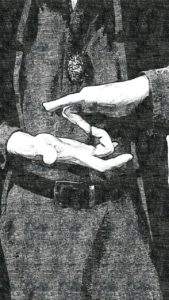
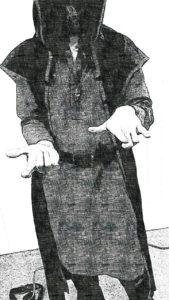
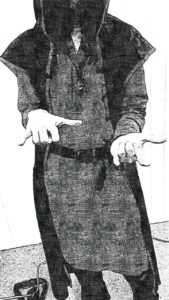
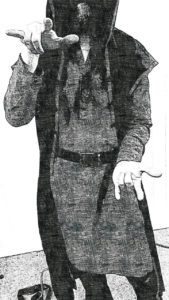
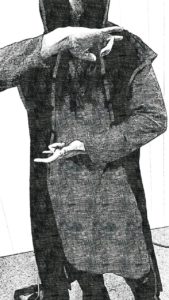
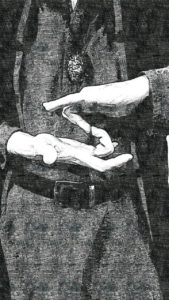
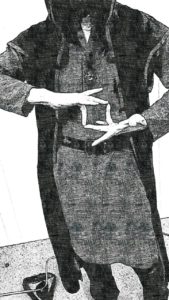

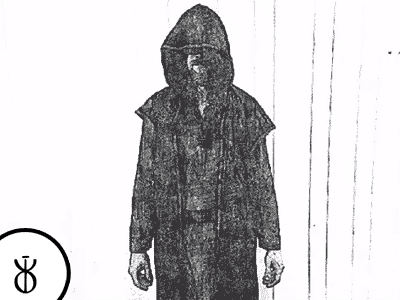
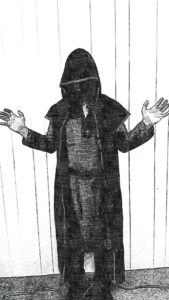
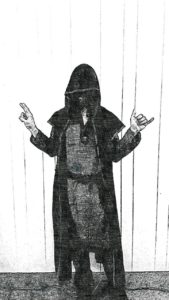

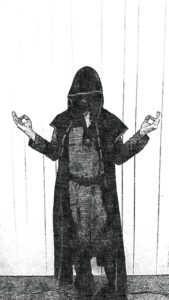
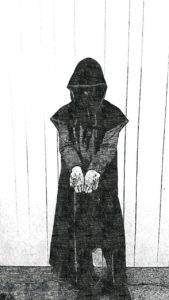
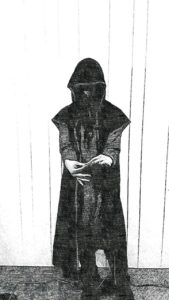
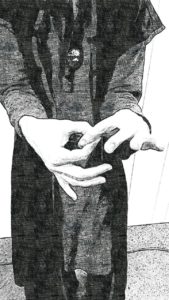
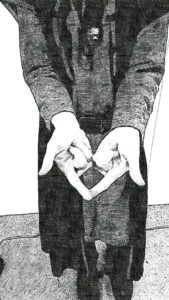

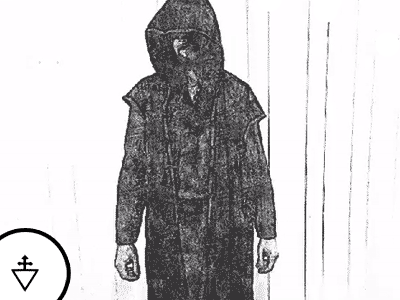
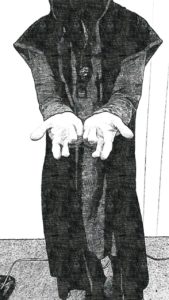
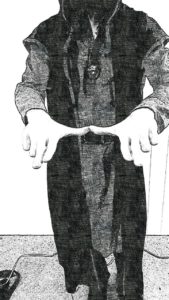
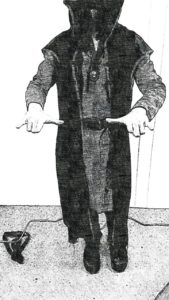
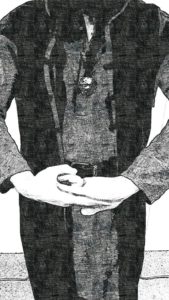
Discipline
A Wizard’s own mental might is their greatest resource, and those with the enough control may Channel even without Arcane Signs or Incantation, gathering power through force of will alone by spending Discipline.
Catalyst
A Wizard may offer up mystical Catalysts, magical dusts that agitate magical forces and make channeling easier. The Wizard must toss a handful of this dust into the air before them to use the Catalyst.
Catalyst is made from rare substances such as volcanic ash, deep sea silt, diamond dust, or fulminated glass. The Guilds have refineries in exotic locals to make use of these substances, but for a Wizard in the field, they usually must resort to making their own. Catalyst can be created by carving up Malefic beings and extracting their bezoars, then refining them through special Apothecarial Techniques. All of this is usually illegal, but needful Wizards can be especially resourceful and secretive.
Anacrusis
In the most desperate circumstances, a Wizard can open themselves up to the destructive energies and use their own body and soul as a medium to summon forth power. The byproduct of this dangerous practice is Anacrusis, which is undiminished by the normal resistance that Wizard have to their own spells.
Limitations on Channeling
Once the spellcasting has begun, it must continue until its conclusion or be lost. If the Wizard flubs or falters on a piece of the invocation, she may start over the entire Incantation, or start over that Sign from the beginning without ruining the spell. If she stops completely for more than a few moments, she must start the spell over again from the beginning. It is not possible to complete part of a spell and then hold on to it to finish at the appropriate moment.
There are certain conditions under which Spellcasting cannot be performed. Most obviously, if the minimum requirements of the spell cannot be met, such as the Wizard is physically bound and unable to perform Signs or offer up a Catalyst, gagged and unable to speak the Incantation or lacks Discipline or the willingness to take on Anacrusis. The Wizard also cannot muster the mental clarity to grapple with the immense magical forces required if they are suffering from Traumatized, Fear or Despair.
The Casting and its Effect
The factors of Channeling the spell can be done in any order, or simultaneously, so long as they are performed accurately. Small inaccuracies from sloppy incantations or signs may allow the spell to succeed but may cause Anacrusis, discussed below, while serious failures will cause the spell itself to fail. Once the spell is complete, the Wizard must face their target, gesture forcefully toward them, and call out the actual Game Effect of the spell so that other players know how to react. The Game Effect will be listed on the Theorem.
Spells usually include their Quality when they call a game effect that originates from magic, such as “Flame Fear”, “Stone Block”, “Lightning Dodge”, or “Water Strike”. Characters who witness Effects with these Qualities can tell they are magical.
In the case of any Enchantment spell, the Wizard must speak the name of the spell and relay its effects to the recipient in order to complete the spell.
Spells come in two basic types – Forces and Enchantments
Forces
Forces are effects that are exerted upon the world itself, such as a hurled stone, a blinding flash of light, the production of a sound, and other such phenomena. Forces target a specific place in the world (such as directly in front of the Wizard, or at a target within close range) and they exert their effects on anyone who falls within that space. Larger Forms target everyone within the space, and can’t exclude specific targets.
Forces usually invoke a simple Game Effect, such as “Strike” or “Sunder” which is called once and then is over. High Duration Spells may have their Game Effect called more than once, such as every other Beat for a Duration. The Spell affects anyone who steps into the Spell’s area, and if the original target stepped out, they are no longer affected. The Wizard, or in some cases a Storyteller, must be there to call the Game Effect, or it does not occur.
Enchantments
Enchantments are those effects which target a character, or object and then stay with them for the Duration of the Spell, even as they move to new locations.
For instance, a spell to increase a character’s Strength Attribute would be an Enchantment, as would something that caused a person to be sneakier, or less sneaky. Because Enchantments change aspects of the target, they cannot usually be directly damaging effects. For these spells, the effect is called just once on the character and lasts for as long as the Duration of the spell says it does. Especially for Enchantments, Anacrusis, discussed below, should also be considered. Enchantments are always optional and can be refused by the target.
Additional Effects
Some spells have special traits that cause or allow the spell to perform differently. This is often the result of a specific Domain being especially advantaged at a given Effect. The advantage allows some additional consideration, or for a lower cost than another Domain could achieve, even if that Domain could accomplish something similar. Some of these effects can also be problematic or negative in nature, or express some limitation on the use of the spell.
Versatile: This Theorem’s Effect is unusually small or simple, and this allows the Wizard to treat the cost of Techniques added to the spell as one category less (Maelstrom becomes Vortex, Vortex becomes Flux) or as if they had 2 extra Fluxes present for the purpose of powering Techniques.
Sweep: This Effect targets everyone in a 90° arc near the target – any people approximately 45° left or right of the target, and everyone between the target and the caster. These additional targets are not optional. Targets must be called out individually by the Wizard as other players are not required to know the meaning of this call.
Capricious: This spell doesn’t always work as expected. This is because the spell’s function relies somewhat on the presence and availability of Staff members to assist the effect, and while they will attempt to accommodate, may not always be available to.
Caustic: This spell also delivers one point of Anacrusis.
Flare: This spell targets the caster and everyone around them out to the Range of the spell
Mien: This spell has significant costume requirements and the target receives no benefit until those requirements are met.
Placeable: This spell should be placed with a tag with a description of its effects. The next person to interact with the tag takes the effects of the spell.
Spatial: This spell creates a placed area of effect that must be visibly staked out by the Magician. The area of effect must be entirely within the range of the spell.
Sympathetic: This spell may target someone beyond its Range if the caster or the target has an item that was involved in resolving a Bond between the caster and the target.
War Magic: This spell may be cast any number of times in a scene without risk of Anacrusis.
Reveal: Sometimes used along with “Silent Obey” calls, affected targets must reveal the requested information OOG. This should be clarified by the casting wizard.
Risks and Limitations
Anacrusis
Anacrusis is the name Wizards have given for a series of conditions that arise from overtaxing a subject, area, or object with sloppy, conflicting, or chaotic magical forces. For any kind of Enchantment type spell, and some beneficial Forces, the Wizard must also tell the subject how many Anacrusis Points they take along with the spell call, such as “Set Intellect to a minimum base of Sound, 1 Anacrusis Point”. Wizards do not suffer Anacrusis for the first concurrent enchantment they cast upon themselves.
Arcane Conditions
There are some special conditions that only affect the process spellcasting. These are usually the result of specific Techniques that cause them in order to disrupt enemy Wizard, though they can be the result of other events, including Anacrusis.
Burn
Effect: The Wizard’s mind is left in tatters and burned out. The Wizard must spend one additional Flux for any spells they wish to cast. This is upgraded to Suppression if they take Burn more than once.
Resolution: 6 hours of sleep or bedrest
SUPPRESSION
Effect: The Wizard finds it extremely difficult to gather and control the power necessary to complete spellcasting. She is unable to perform any spellcasting while this Condition persists. Existing spells continue to function as normal until their Duration elapses.
Resolution: 6 hours of sleep or bedrest
Limitations on Spells and Effects
- Spells affect the item they are targeting directly. In other words, a heat spell on a ring makes the ring hot, not creates a ring of heating. A Mystery exists to ensorcel an item so that it grants abilities to its bearer.
- Spells cannot have spells themselves as the target, such as using a Speed spell to make a spell expire more quickly.
- Spells cannot create the Sacred or Hideous Qualities.
- While magic can heal many ailments, it can’t directly heal injuries.
- Spells cannot grant knowledge directly, such as conferring Skill ranks, Studies, or any kind of information. Spells can grant the user supernatural perceptive abilities to see a distant place, read the mind of another, or otherwise reveal existing information that is otherwise obscured, but can’t simply confer knowledge directly.
Spell effects usually have no difficulty combining if their effects are quite different from one another. However, any spell that provides the exact same bonus as another Game Effect takes the best bonus of those. For instance, a Speed Spell that grants a use of Dodge does not combine with a Movement Spell that also grants a use of Dodge. Both give the same bonus, even if they accomplish it different ways. Similarly, a spell that mimics a Game Effect that is already true some other way does not stack. For instance, a Spell that treats the target as if they have Medium Armor does nothing if the target is already wearing Medium Armor.
